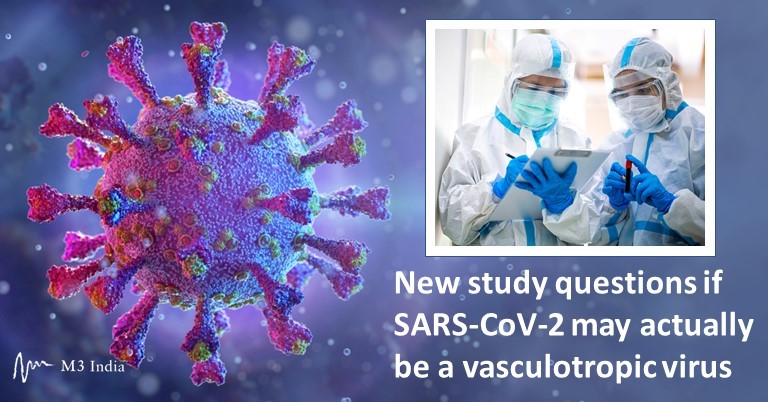New study questions if SARS-CoV-2 may actually be a vasculotropic virus
M3 India Newsdesk Jun 15, 2020
From the time it was first identified in late 2019, the SARS-CoV-2 virus which causes COVID-19 has been thought to be a respiratory virus, largely due to pneumonia-like symptoms infected individuals had developed. However a new study hypotheses that it is possible that the virus is actually a vasculotropic virus, one that causes a disease of the blood vessels.
For our comprehensive coverage and latest updates on COVID-19 click here.

The authors of a recent study "Endothelial cell infection and endotheliitis in COVID-19" stated that SARS-CoV-2 affected endothelial cells in various organs of the body, namely the lungs, liver, heart, and kidneys of those who had contracted the virus. The findings of the study have been published in the Lancet medical journal.
The study published in the journal reads:
“Our findings show the presence of viral elements within endothelial cells and an accumulation of inflammatory cells, with evidence of endothelial and inflammatory cell death. These findings suggest that SARS-CoV-2 infection facilitates the induction of endotheliitis in several organs as a direct consequence of viral involvement (as noted with presence of viral bodies) and of the host inflammatory response. In addition, induction of apoptosis and pyroptosis might have an important role in endothelial cell injury in patients with COVID-19.”
The authors further go on to note that given their findings, the use of antiviral drug therapy to treat infected persons may not be the ideal treatment, however this is yet to be explored.
In addition to the commonly seen symptoms of high fever and respiratory difficulties, some other frequently seen symptoms began to raise questions in the minds of doctors. This included ‘COVID toes’ a term used to describe the condition wherein infected individuals began presenting with red and purple toes which was used to describe the discoloration that appeared due to suspected blood clotting.
Soon after, scientists noted that several complications faced by those who had been infected with the novel coronavirus developed cardiovascular related complications. Suspicions had also been drawn that people were suffering strokes after contracting the disease. All these findings began to tie together a new conclusion by the scientists: perhaps SARS-CoV-2 was not a respiratory virus.
Experts also began to notice that post-mortem pathological analysis of tissue samples of those who had died due to the disease showed hints of viral-induced damage to the endothelial lining of blood vessels in various organs and tissues. The endothelial layer of blood vessels offers protection against blood clot formation, under normal circumstances, however if the lining is damaged by the virus, more clots may form. All of these clues further tied together their suspicions that SARS-CoV-2 was a ‘vasculotropic virus’, one that affects blood vessels.
The virus begins by latching onto receptors of cells in the lungs which then begins to spread to the rest of the body via the bloodstream. This, experts have reasoned, is the cause for non-respiratory related symptoms including stroke, encephalitis, carditis, and kidney damage.
While there is still much to be studied and explored before any proper treatment emerges for COVID-19, such studies offer significant insight into the unknown. At present, these studies are being used to understand whether the use of anti-inflammatory drugs rather than antiviral drugs might prove to be more effective when treating sick individuals.
-
Exclusive Write-ups & Webinars by KOLs
-
Daily Quiz by specialty
-
Paid Market Research Surveys
-
Case discussions, News & Journals' summaries